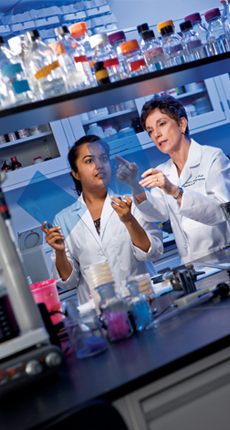Pursuing Cancer’s Secrets
Graduate students pursue promising research in multidisciplinary program.
Cancer—despite biomedicine’s most concerted efforts to defeat it—remains a highly complex, elusive disease that demands the most novel diagnostic and treatment approaches. The Sylvester Comprehensive Cancer Center’s Sheila and David Fuente Graduate Program in Cancer Biology teaches the next generation of cancer researchers to integrate the most advanced concepts and techniques in molecular and cell biology, biochemistry, genetics, genomics, proteomics, animal models, and biostatistics in the quest for more accurate diagnostic strategies and improved therapeutics.
This innovative doctoral training program enables students to interface with basic scientists, clinical cancer researchers, and physicians throughout the University as they design and conduct multidisciplinary research projects. Students select both a research mentor to guide them in basic science and translational investigation as well as a physician mentor who exposes them to the challenges of clinical cancer care and unmet research needs.
The Sylvester Comprehensive Cancer Center’s Sheila and David Fuente Graduate Program in Cancer Biology is teaching and mentoring the next generation of cancer researchers.
The program is directed by Kerry Burnstein, a professor of molecular and cellular pharmacology. Burnstein oversees a curriculum that strives to integrate students into the extensive clinical and translational research programs of the Sylvester Comprehensive Cancer Center while reinforcing the interrelationships of basic biological discoveries and clinical applications.
"The program’s two-tiered mentoring system provides graduate students with unique and valuable training,” says Burnstein. “This dual mentoring has the added benefit of increasing interactions among faculty scientists and clinicians, which is a strong impetus for University-wide translational research efforts."
“I like the program because it provides unique educational opportunities that encourage graduate students to become independent and passionate about learning and discovery,” says Samia Khan, a doctoral candidate in the program. “The supportive faculty encourages collaborations among the diverse cancer labs, which brings together state-of-the-art techniques and scientific concepts and makes learning enjoyable at the same time.”
